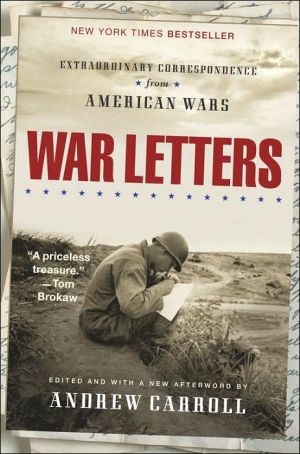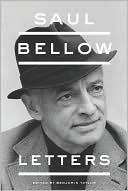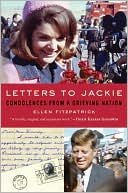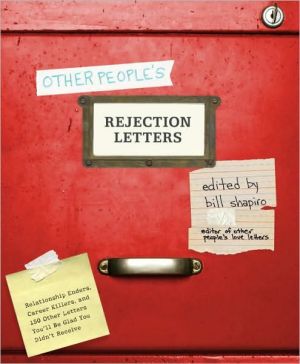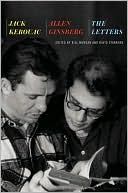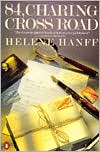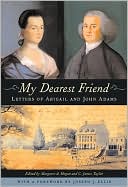War Letters: Extraordinary Correspondence from American Wars
In 1998, Andrew Carroll founded the Legacy Project, with the goal of remembering Americans who have served their nation and preserving their letters for posterity. Since then, over 50,000 letters have poured in from around the country. Nearly two hundred of them comprise this amazing collection—including never-before-published letters that appear in the new afterword. Here are letters from the Civil War, World War I, World War II, Korea, the Cold War, Vietnam, the Persian Gulf war, Somalia,...
Search in google:
In 1998, Andrew Carroll founded the Legacy Project with the goal of remembering Americans who have served this nation and preserving their letters for posterity. Since then, more than 50,000 war letters discovered in basements, attics, scrapbooks, and old trunks have poured in from around the country. The best of these letters are assembled in this extraordinary collection, offering unprecedented insight into the Civil War, World Wars I and II, Vietnam, Korea, the Cold War, the Persian Gulf, and even the fighting in Somalia and the Balkans. Featured here are dramatic accounts of combat written immediately after the most ferocious battles American troops have ever faced; poignant expressions of love by homesick husbands and sweethearts; humorous anecdotes and gripes about insufferable conditions; thoughtful reflections on the nature of warfare; and perhaps most devastating, a startling number of last letters, heartfelt messages penned just hours before the sender was killed. War Letters is a testament to the heroic contributions and astonishing literary voices of common soldiers, marines, airmen, and sailors, as well as war nurses, journalists, spies, and chaplains. There are also previously unpublished letters by such legendary figures as William T. Sherman, Clara Barton, Theodore Roosevelt, Ernie Pyle, Helen Keller, Douglas MacArthur, Julia Child, Dwight Eisenhower, Norman Schwarzkopf, and America's first black general, Benjamin O. Davis Sr. "Individually, the war letters collected here are distinct, finely cut works of art, some more polished, some rougher around the edges, but each one exquisite in its own right. Together, they create a larger narrative: the story of Americans at war against themselves and other nations," observes Carroll in his introduction. These historic letters capture the full fury and intensity of warfare, and they reveal in vivid detail what the servicemen and -women of this nation have experienced and sacrificed on the front lines. War Letters is a lasting tribute to those who have fought for this country, and a celebration of the enduring power and lyricism of personal letters.Publishers WeeklyCarroll founded the war letter-collecting Legacy Project when his Washington, D.C., home burned down in 1990, taking his family letters with it. A "Dear Abby" announcement of the project led to 50,000 responses. Now, at 31, Carroll follows up 1999's bestselling Letters of a Nation (which spans 400 years and myriad walks of life) with this cull of dispatches. Chapters are limited to the Civil War, WWI, WWII, "The Korean War & The Cold War" and "The Vietnam War, the Persian Gulf War, Somalia, & Bosnia" making for an incomplete survey of American wars. Of the more than 150 letters, three are from African-Americans, though Carroll remarks in an afterword on efforts to locate more. Perhaps most striking is how many letters are written by the soon-to-be-dead, or concern the death of a close relative; any reaction to them other than personal sympathy seems impossible. Yet the power of these voices from various fronts including an Asian woman held in an American internment camp is undeniable, and the sentiments and observations they record have a compelling immediacy. (On-sale: May 15) Forecast: Carroll was the subject of a New York Times feature in 1994 for his role in cofounding (with the late poet Joseph Brodsky) the American Poetry and Literacy Project, which put books of poems in motel rooms alongside Bibles. His media experience should make his seven-city author tour and appearance on PBS's American Experience (on November 11) successful. Expect strong sales and a showing on bestseller lists for the weeks before and after Memorial Day. Browsers could be reminded that the New Yorker published a selection of the letters in January 2000. All author earnings will be donated to nonprofit organizations. Copyright 2001 Cahners Business Information.
Excerpt from The Civil War\ Griping about insufferable conditions was not uncommon, but a number of soldiers took a more drastic step: they deserted. During the Civil War an estimated 280,000 Union and 104,000 Confederate soldiers were classified as deserters — to date, the highest rates recorded in American wartime history. (At the height of the Vietnam War the numbers peaked at 7.4 percent, compared with an average of about 11 percent in the Civil War.) Punishments for desertion varied from receiving a mere reprimand to being flogged, imprisoned, branded on the face with a "D," or, in the most serious cases, shot. The latter was rare; executions could have a counterproductive effect on troops, and the vastly outnumbered Confederacy could hardly spare the men. Newspapers were quick to report when executions were carried out, serving as cautionary reminders to those tempted to flee. But these reports were not always accurate, as a mortified young Union private named Francis Christiance discovered one day while reading the paper.\ \ Alexandra Heights, Oct. 7, 1861.\ \ Dear Wife,\ I this day received an issue of the Star and Times containing the following paragraphs which no doubt overwhelmed me as much as it certainly must have done you. "To be shot: Francis Christaince deserter from the ranks of Capt. Truax'es Company, one which we have known for a long time was sentenced to be shot and perhaps met his faith at noon to-day. We have not given this fact publicity before, we did hope for and do not yet despair of a reprieve for the misguided soldier though the fact that this terrible punishment is meted for a second offense seems to abide it: — "\ I simply deny in to each and every specification contained in the above.\ 1st. I am not shot.\ 2nd. I am not sentenced to be shot.\ 3rd. There has not been here the slightest supposition among the men or myself that I was to be shot.\ 4th. I never deserted from Capt. Truax'es Company nor have I ever been tried for any charge for desertion. From whence these false assertions could have originated I cannot surmise. But if he has feeling for a kind and loving wife, a household of children, not to say of the grief that fills your heart at this report, he certainly would not be humanity to contradict it.\ This afternoon Col. Jackson has received a letter requesting the transmission of my dead body to my wife, my feeling may better be imagined than described. The editor of the Star certainly should bare a great deal of the blame for publishing a rumor leaving a whole family on the foundation of what must have been a mere rumor, but this is not the first nor I suppose the last kindness we will receive from those we left behind.\ Truly your loving and yet living husband, \ Francis Christiance.\ \ Another Union soldier, Charles Bingham, wrote to his wife, Sarah, to describe in chilling detail the execution of a deserter, whose death he witnessed firsthand.\ \ August 9 1863\ Same old camp 6 miles from Rebbys\ \ \ My dear wife\ i seat myself again to pen a few lines to you again as it is Sunday and did not think that i could let the day pas without a little conversation with you and it may be that you are engaged at the same business at this moment i would like to know if you are out but i supose that the day will be spent in visiting with happy friends and neighbors and i would not wonder if you had a quite a good time at it i hope that you will\ i tell you what it is it is so hot here that it aint comfortable a setting in the shade and do nothing i had a letter from mother two or three days ago she was well at the time she is to work out there for ten shillings per week and she says that this fall she is a coming out to see you if she lives\ the day before yesterday the execution of a man took place out in front of our camp it seems as though he had enlisted some three times getting a big bounty each time and then desert again i stood and watched the execution of him the division that he belonged to was marched out the band playing a lively tune all the while untill they formed a hollow square then came the officer on horse back then came the pallbearers four in number carrying his coffin the one that i spoke of in one of my other letters close to them was the chaplain and the criminal keeping the step as firm as if he was going out on parade\ next came the band playing his death march in fine stile but it did not seem to affect him in the least and following them was 12 with loaded guns and i think there was four others with loaded guns in reserve so if the first did not make the work of death complete the others could finish it at once\ they marched in and sat the coffin down and took their position behind the man the chaplain then stood by him and made a prayer and shook hands with him bade him good bye and steped back\ the officer approached him and he steped forward took off his cap and blouse laid them down alowd himself to be blindfolded and then took a seat on his coffin the officer shook hands with him and bade him good by and steped back to the twelve exicutioners the criminal then raised his hand three times holding it out straight the last time but he did not hold it long before the death messengers hit him he fell from of his coffin and lay there kicking\ the officer steped up and called the others they stood there they came puting their guns quite close to him and let drive and that was what all called butchering and then my company right ahead guide right march pass in review pass and the whole division passing by where he lay and so back to their quarters and so ended the life of a Deserter\ So i have give you as good an idea of the matter as I can but believe me that i dont want to see any more such proceedings The first shots i did not mind so much but when the others came up and almost put their guns against his breast and head it all most made me sick and as many as was seen at gettysburg laying dead it did not cast as mutch solemnyty over the troops as that one mans death did and what will his wife think when the news reaches her for i have heard that he left a wife and two children\ well i must drop this and wind up i am well and doing well and god grant that this bad mess of scribling may find you in good health the weather has been exceedingly hot for all i thought that it was getting colder please write as often as i remain your kind and affectionate husband and shall till death give all the love that you can spare to them that kneeds it only keepe what you want.\ \ Charles E. Bingham, Sarah J. Bingham\ so good by for this time\ \ \ Copyright © 2001 by Andrew Carroll\ Excerpt from World War I\ Goldie Marcellus Mails Her Husband, Edward, a Love Letter — Which He Promptly Returns with Commentary\ It cannot be determined precisely why, when, or how Goldie Marcellus and her husband, Edward, settled on their unique epistolary system. Possibly it was to save paper. Or Edward may simply have been a man of few words. But whatever the reason, after receiving her handwritten expressions of affection from the homefront, Edward, a clerk stationed in German camps overtaken by the Allies, would type succinct, sometimes teasing remarks directly on her letters and then return them to her. The following is just one example. (His words are in bold.)\ Dear Husband,\ This is a Sat. afternoon and I have the work all done and washing on the line. Smart girl I do not know what they would do without me I must say. I am sure very tired. You see Mamma is sick at Proctor Hospital & Dad away and Gladys is not real strong & Hila will not work too hard No for fear she might spoil her buty beauty. Yes, Booty is right.\ Mother is getting along just fine now. That's good.\ Excuse this writing for my arm is so tired. When I was home I did not know what work was. I didn't think so. I received a letter from Pearl. Why don't she write to me? She is not well at all poor girl. I think she will never get strong now. She says that her husband comes home at night and does up all of her housework. Very nice of him. It is hard on him, but it sure is nice that he is so willing to do it. Your mother goes over and does the washing & ironing and the baking. and talking So you see that she must be a very weak woman. Yes, you are right One should be so happy if they have good health.\ I took your picture to church with me. (You see I just must have you with me that is all.) That is a catastrophe\ Everyone thought you sure was a fine fat looking young man. Our preacher's wife, a most lovely lady, said "your husband sure is nice looking" and the preacher said "not only he, but he is the posseser of a nice looking young wife." I will look more pretty when you get home, dots gut for I will be more happy. I want to keep myself looking well for you and you alone. We both must keep our health at any cost, for health and looks go well together. I hope and pray you can come home soon.\ Your picture stands right in front of me this very moment. Why don't you send me some of yours? I have worn yours out already. I can hardly believe it is you. The only part that looks natural is your eyes. And what about them? I just have to kiss that sweet fat face every time I look at your picture. Well I must stop a bragging on you for you might run away with some pretty girl over there. Ha. Ha. There isn't any.\ It is a setting in for a rainy evening.\ Mother is getting along just fine and I think we will bring her from the hospital by next Sunday. I think she is strong now. It seems so lonesome with just women about the home. Just think we have three of the best men on this earth and every one of them is miles from home.\ Ed I get all of your letters now, but they all come in bunches about every two weeks. Glad you get them anyway.\ There is an article in the High School paper about Me. It is on my efficiency in Type. Can you afford to buy another? They have sent it to Hazel & Stella or I would clip it out for you.\ So some of the men in your Co. go with girls. No, not girls, fraulines. Well dear Ed, I expect there is much more of "not being loyal" by the girls over here. Yes, I know all about them. I just read in the paper where a returned soldier came back only to find the one he had been true to in love with another man, so he killed her. Yes, you'll find the members of the A. E. F. are not afraid to kill. I do not believe in killing but she really got what she deserved I must say. I guess one side is as bad as the other.\ Do not even let Herb know this, but I prayed for Gladys C. not to give him up & marry some other man too sickly to fight for his own country. Several weeks ago she came to me on her way home from work, her eyes filled with tears and said "Goldie, oh help me out, you are a married girl and one of my dearest friends." I really am not surprised at this but do not tell her I said so. I won her on the point that she did not know men at all, if she would turn untrue to Herb he being such a strong man, would just go all to pieces Yes, I believe he would and just throw his life away. Well she went home and thought it over and now "all is well" and Herb is alone shining in Gladys' sky. Good, you're a missionary too. Oh, I have read some of Herb's letters and Ed his future entirely rests with that girl. I sure am happy over the outcome.\ Oh See it is mail time and I do want to get this in the box by 4:30. So I will have to close. (I could write to you by the hrs.)\ Take good care of yourself and I will do the same. So By By my dear hubby, I enclose all love for you\ From your loving wife,\ Goldie\ Ed\ Ed Marcellus survived the war and returned home alive and well.\ Copyright © 2001 by Andrew Carroll\ Excerpt from World War II\ Army Nurse Vera Rieck Writes to Her Family About a Deadly German Attack on Her Ship in the Gulf of Salerno\ "It wasn't just my brother's country, or my husband's country," said Beatrice Hood Stroup of the Women's Army Corps, "it was my country as well. And so this war wasn't just their war, it was my war, and I needed to serve in it." During World War II literally hundreds of thousands of American women volunteered for military service in the Women's Army Corps (WACs), the Marines, the Women's Air Force Service Pilots (WASPs), the Navy's Women Accepted for Voluntary Service (WAVES), and the Coast Guard's SPARS, derived from its motto Semper Paratus — "Always Ready." Employed as radio operators, mechanics, cryptographers, truck drivers, gunnery instructors, electricians, intelligence analysts, air-raid wardens, control-tower personnel, and pilots, their responsibilties extended far beyond the clerical work that some, uncomfortable with the idea of women in uniform, had argued they were best suited for in wartime. Over 72,000 women also served as war nurses, many of them working in or very near to combat zones. Hundreds of American women died as a result of their service in the war, and in the middle of September 1943 army nurse Vera Rieck came close to being one of them. Beginning on September 9, Allied forces began a ferocious six-day invasion of Salerno, Italy, that nearly failed. Rieck, with the Ninety-fifth Evacuation Hospital, was aboard the HMS Newfoundland in the Gulf of Salerno. Despite its colored lights identifying it as a hospital ship, the Germans targeted the Newfoundland on September 13, killing several nurses. Two and a half months later, Rieck wrote to her family in Lewellen, Nebraska, to describe the bombing.\ \ Wed - Nov 24 - '43\ \ Dearest all:\ Just yesterday I wrote you a letter but your air mail of Oct 30th & V-mail of Nov 7th came this morning so will answer them today. Jan and I got up for breakfast this morning and made a dashing trip with our mail man to another town to have my picture taken for my Identification or a.g.o. card. I've been without a bit of Identification since the bombing — no dog tags, no pay datta card — I'm almost not in this army. It has sort of worried me to — because something could have happened & no one know who I belong to. I still have my chain around my neck but the dog tags were torn off — Guess that something fell on my chest that morning & took them off.\ I still don't know if this will pass this the censor but will try & tell you what happened the 13th of Sept. We tried to land in Italy all day Sunday the 12th but they were too busy fighting to worry about a hundred nurses on a hospital ship. Several bombs just missed us several times but we didn't really realize what it was all about. Evening came & we had to go out of the harbor because our ship was all lit up. We taxied around in the sea off shore about 30 miles all nite — our ship & 4 other Hospital ships — at 5 a.m. we were awakened by a bomb falling very close to us — Some of the girls dressed then but most of us went back to sleep. (We all slept in the nood because all our clothes were packed & ready to get off the ship the next morning.)\ At 5:10 we heard a plane & then that bad awful whistle a bomb makes & bang! — You'll never know of the thousand things that flashed thro my mind those few seconds. I thought sure I was dying — could feel hot water falling on my face & body — Had heavy boards on my chest that had fallen from the ceiling — I shut my eyes & thought it was the end — Then the next second I thought "What the hell, I'm not dead — get out of this place" — then I could see poor Wheeler & Waldin without a stitch of clothes on trying to find anything to put on. I couldn't see for the terrific smoke in our room — but was a mass of motion trying to find my coveralls which I had hung on the post hole the nite before. I found them on the floor — all soaked with water & black with dirt — put them on & found my shoes — grabbed my helmet & water canteen & grabbed on to someone's arm & followed the light that Claudine was holding. She coudn't hardly find where the door was because the wall had all been blown out.\ When we got on the deck we all had to get on one side because the bomb had torn away the other side of the ship. I'll never forget seeing this one British nurse trying to get thro the porthole but was too large to make it. She was screaming terribly because her room was all in flames. One British fellow saw that she could never get out so he knocked her in the head with his fist and shoved her back in his room — She died but it was much easier than if she had burned to death.\ We loaded in a life boat — 70 of us in one boat that had a capacity of 30. Were taken on another hospital ship & given tea & hot coffee. I felt a darn good cry coming on so some British fellow took the 4 of we girls to his room & we drank a bottle of Scotch. I got "stinko" drunk — cried & when I snapped out of it, I felt fine. All the bruises I got out of it was a scratch on my knee, a cut on my left foot and marks & scratches on my chest where debree fell from the roof.\ — Someday I'll tell you more about it....\ \ Love,\ Vera\ \ \ Copyright © 2001 by Andrew Carroll\ Excerpt from The Vietnam War, the Persian Gulf War, Somalia, & Bosnia\ From the chaos of Vietnam emerged another horror: An astonishing number of American soldiers were being killed by their own men. Unintentional deaths from "friendly fire" were deemed a regrettable but inevitable consequence of combat in any war. What concerned the military about Vietnam, however, was that hundreds of deaths were believed to have been from "fragging," the intentional killing of sadistic or dangerously incompetent officers by their subordinates. (Although fragmentation grenades were the weapon most associated with the practice, the term fragging assumed a more general definition as officers were murdered by other means.) During the later years of the war, as unit cohesion and discipline unraveled, combined with increasing drug abuse and racial tensions, reports of fragging rose to their highest levels. In April 1970, an infantryman in Cu Chi and Tay Ninh alluded to both friendly fire and fragging in a letter to his parents back in Fort Atkinson, Wisconsin. (The soldier's full name has been withheld for reasons of privacy.)\ Dear Mom & Dad:\ Got your letter today containing the stamps. Was really glad to get them. Sent three more rolls off to be developed and am sending a packet of slides with this letter.\ Sounds like Theresa can really sing. Wouldn't it be great if she really made it big like T.V., records and live performances. Hollywood here I come! No, really it sounds like she's got talent though.\ Seems Scott has the same problem with clothes I had. I'll give him a hint next time look on the floor. He'll find enough to dress himself 3 or 4 times I'll bet.\ Well, I'm playing chicken for a few days now.\ I volunteered for K.P., trash run and other nasty details, like burning _______ in a barrel while my Co. went out on this four day mission.\ It sounded as though they'd see some certain action. Our company linked up with two other battalions to sweep a 4 mile area, trying to flush a regiment of expected V.C. Then last night the artillery had an hour fire mission giving them rear support so they must have made contact last night. At 10:00 we had 6 incoming rounds expected from a V.C. 82 mortar. We manned bunkers and were expecting a follow up ground attack but nothing happened.\ Then this morning while we were dumping trash in the dump, someone had set fire in the dump and off went what we thought a grenade. Threw shrapnel all over. I only caught a couple small pieces in the right pectoral muscle and luckily the trailer and truck were between me and the explosion which was only 10 feet away. One other guy got his face messed up pretty bad and had to dust him off to a hospital.\ It's so stupid and ridiculous of how so many of our boys are killed by accidents due to some careless mistakes.\ Like the guy I saw die, the helicopter crash killing 13 people, and for another example, 2 nights ago, B co. blew an ambush on their own people due to a simple communication mistake and these two squads started blasting away at each other. Two men were killed instantly by Claymore mines, another lost his legs and 5 more injured. All due to GI mistakes. They say as high as 50 % of deaths and casualties are caused by our own men and so many parents never know how their son was killed because all the Army tells them is that they are combat casualties.\ That's why I was afraid of this mission. Because our commanding officer is insane. Gungho lifer looking for nothing but a body count of enemy so he can make a stupid promotion.\ Like on this last 9 day mission, one night he made us fire mortars from our night position ambush saying we needed practice. All the V.C. had to do was zero in on the noise with their mortars and we'd be hurting. The Lieutenants tried to explain the hazards of doing this but he pulled rank on them and that's all that could be said.\ I know for one fact with the hatred his men have for him, that if we ever got in a fire fight someone will knock him off. It happens quite a bit and I'm for certain It'll happen here. I've never seen such hatred.\ With all the war atrosities, people act like animals. That's why they happen. It seems these lifers go nuts. Army means battle, death and victory to them.\ Enough about him.\ I've been wondering if you ever received a $20 money order I sent about a month and a half ago. Please afirm this if you should remember next time. Not that I'm worried, but I like to keep track of the money I send and I could forget and never even miss a $200 check....\ Finally got a hair cut. Glad to be rid of that stuff over here. Hot, dirty and hell to keep up.\ Well, I have to go now so say hi to Grandma & Grandpa for me. Thanks again for the stamps.\ \ Love\ Steve\ \ \ Copyright © 2001 by Andrew Carroll\ Excerpt from The Vietnam War, the Persian Gulf War, Somalia, & Bosnia\ S. Sgt. Dan Welch, a tank commander with the 1st Infantry Division, Seventh Corps, was also elated by Iraq's surrender. But in a letter written to his mother and extended family back in Maine a week later, Welch began to express more ambivalence about the brief, almost surreal war he had just experienced. Welch was also unsettled by the Allies' decision not to assist the Iraqi rebels struggling to topple Hussein. (Marianne is his wife and Chris is his three-year-old son. Although Welch states that he is writing from the "King Faud Military City," he later realized he was, in fact, at the King Khalid Military City.)\ \ 8 March 91\ \ Dear Y'all\ I'm now back in Saudi Arabia. I'm in a maintenance collection point about 20 miles from King Faud Military City (K.F.M.C). The rest of my unit is still in N. Kuwait. My tank developed an oil leak part way through the fighting, and finally quit 2 days ago.\ I don't know if KFMC is on the map, but if it is you know where I am. I sure don't. I wrote some place names I saw on the way here on the back of my hand, but I did my laundry today and......\ We passed Kuwait City on the coast road in the middle of the night. I can't describe it. I mean the scene on the highway. We all just looked at it in the moonlight as we drove through the now silent carnage, going "God damn, God damn......"\ I talked to a lieutenant today who saw it during the day while it was still fresh, and he gave an interesting description of the dead that still littered the highway, vehicles, etc. He picked up a beret out of the front seat of a car, with a dead Iraqi in the back seat, eyes wide open, frozen in a silent scream.\ I still think of the guy I shot the day before we attacked. If I hadn't done it, he could have been in an EPW camp right now, waiting to go home, just like me. He probably would have surrendered along with most of the others, just one day later.\ We should be able to get to the phones in the next day or two. You'll already know if I did when you get this.\ They're talking we'll be here like probably three weeks or so, then move into the KFMC itself for 3 weeks or so, and then move from there toward the aircraft. We heard the first guys got home today. 100 from 24th Mech at Ft. Stewart.\ I guess I haven't said anything much about what I'd done during the ground war. I started writing to Marianne about it, but it didn't come out right. We didn't do much shooting, though we (my tank) expended more ammo than any of the others in my platoon. We never shot another tank or vehicle, except one suspect tank, that, after the dust from the artillery settled, ended up an already dead heavy truck. We shot up some trenches and bunkers, mostly empty. But you never really know. We ran over some AP mines and unexploded DPICM and cluster bombs here and there, received some incoming artillery off to our flank once, etc. Mine missed an anti-tank mine by about 2 feet on the right side once coming around a dune, and at our speed would have probably gone off under my gunner and I.\ It never seemed like a war. More like a field problem. Even when stuff was burning all around you and firing going off all over the place, artillery firing from behind you and landing to your front. It was very real, but more a curiosity than anything else. I just can't describe it.\ Like one time 21 was right next to me, and we were on the move. He was on my right, and ran over an AP mine or submunition with his left track. It exploded and sent shit flying past me. I was up out of my hatch, and the first thing that came to mind was can I get to my camera before the smoke clears? I didn't even think to duck. And the L.T. (21) just throws his hands up and smiles, like "Oh well".\ The first time I ran over one I thought that 23, to my left had fired his main gun. I didn't realize 'till one of the others ran over one what had happened. Sometimes the stuff blows a hole through the track, etc. Sometimes it doesn't scratch it.\ When we were breaching the main Iraqi defense line in the neutral zone, an idiot popped up with an AK from a trench and started firing. Mine was the first to return fire, and he didn't pop back up. Although the muzzle fask was pointing at us, you just don't think of it as someone shooting at you. Just a target and you engage it, like on a range.\ Right after I released the mineroller and was linking back up with the platoon, some incoming artillery rounds landed maybe 300-400 yards from us to the left and my only consideration was that it wasn't a very good shot. And the second volley never came, so I just figured that our counter-battery must have had better aim.\ Can you understand what I'm saying? I think I would have had to have gotten hit for it to seem different. I guess I've played it so much for the last ten years that it just didn't seem much different than the training. I've had field problems that were tougher. This only lasted for four days. It wasn't even long enough to seem like a war. The waiting and worrying before we did it were worse than doing it.\ The only time I was ever really afraid was a couple of weeks before we did it. Then I got over that. After that, the only time I thought much about it was when I would picture that split second as the impact would rip my cupola from the turret and half my body would collapse onto my gunner's back, and the resulting tears back home. But not even that from the time the prep bombardment ended and we rolled forward through the cease fire.\ The thing that was hardest for me was knowing how Marianne and you, Ma, were probably taking this back home. The image I've had of you two sitting in front of the T.V. afraid that I'm already dead, can and has choked me up and brought tears to my eyes. Even now as I write this I'm hoping that Marianne isn't still waiting for the "We're sorry" Team to come knock at the door. I wish I could get to a phone to relieve the pain.\ You don't know what it's like to hold an M-16 up to a man's back and make him clear out of a trench, and pick up a few pieces of rock hard bread, blue and green with mold, and break pieces off and eat them.\ Or realizing you came a few feet from crushing live men that you thought were dead, and only saw at the last moment because they were too afraid to stand up.\ It's only been the last couple of days that I've come to realize the horror that has taken place here. It's not a personal feeling of horror, but more an overall picture of horror. And I think it's taken so long because with only the small number of exceptions on our part, it was almost entirely theirs.\ I can only imagine what it was like for those who were part of the carnage of which we witnessed the silent aftermath on that highway. It is just so very strange.\ I'm just now realizing the significance of all these things I've been through and seen, that were at the time merely curiosities. It's just different now. I don't know if I'm really explaining it or leaving you wondering what the hell I'm trying to get across.\ I wish that that night that we were mopping up the remains of that republican guards division that there had been another one behind it, so that there would be less of them left. We have now left the rebels in Iraq with a much harder problem to solve in their struggle. And when we pulled up to Basra, we had to halt for about an hour while a battalion of Rep. Gds. T-72's pulled out of the positions that we sat in for 3 days before we withdrew. They left one behind that they couldn't get started, and I smashed out all the optics and visions blocks with a tanker's bar with delight, knowing how much work and money they'd spent fixing it. We should have torched it after we stripped it, but by that time it was a no-no.\ The news said that rebels had come to our lines asking us to join them, and also said they were running short on ammo. Of course we couldn't join them, but I and others would have led them to the vast stock piles in our vicinity if they had come to us.\ I think we've made a mistake and not finished this the way it should have been ended. There is now a weakness in my heart for the people of Iraq. I'm still trying to explain what has gone on here. The next time you go to the drive-thru at McDonalds, remember that you haven't been living off rice, onions, and radiator water in your hole in the ground for the last month and a half, hoping you won't be exterminated by a pilot you don't hate, because someone told you if you didn't they would kill you and your family.\ The next time you see someone throwing garbage at the White House, know that a helicopter is not going to spray them with nerve gas.\ Don't hate the guy that has been busy burning Kuwait hotels and dragging people off, because it's been happening in his hometown for quite a while now, and by now he probably doesn't even realize what he's doing.\ It may appear to most of us over here and to you back home that we've done our jobs, but we've screwed up and didn't finish it. He's still alive, and unless somehow the rebels finish what we've started, we may be back.\ I guess I'm finally starting to feel I've fought in a war.\ This is what I expected it to be like in the first place before I came over here. It just took a while for it to sink in that it really was. I think the easy victory just clouded the undertones until I reflected on it for a while here tonight.\ But I still think we did the right thing, although we didn't go far enough. I still like what I do, this hasn't changed that. And I'm not psycologically scarred or maimed for life. If anything, this has just reinforced all I've believed in before I came over here. And I'll be home soon.\ \ Love,\ Dan\ \ \ P.S. I hope you're saving all my letters. Someday I'd like to go through them with Chris.\ Copyright © 2001 by Andrew Carroll
\ Publishers Weekly - Publisher's Weekly\ Carroll founded the war letter-collecting Legacy Project when his Washington, D.C., home burned down in 1990, taking his family letters with it. A "Dear Abby" announcement of the project led to 50,000 responses. Now, at 31, Carroll follows up 1999's bestselling Letters of a Nation (which spans 400 years and myriad walks of life) with this cull of dispatches. Chapters are limited to the Civil War, WWI, WWII, "The Korean War & The Cold War" and "The Vietnam War, the Persian Gulf War, Somalia, & Bosnia" making for an incomplete survey of American wars. Of the more than 150 letters, three are from African-Americans, though Carroll remarks in an afterword on efforts to locate more. Perhaps most striking is how many letters are written by the soon-to-be-dead, or concern the death of a close relative; any reaction to them other than personal sympathy seems impossible. Yet the power of these voices from various fronts including an Asian woman held in an American internment camp is undeniable, and the sentiments and observations they record have a compelling immediacy. (On-sale: May 15) Forecast: Carroll was the subject of a New York Times feature in 1994 for his role in cofounding (with the late poet Joseph Brodsky) the American Poetry and Literacy Project, which put books of poems in motel rooms alongside Bibles. His media experience should make his seven-city author tour and appearance on PBS's American Experience (on November 11) successful. Expect strong sales and a showing on bestseller lists for the weeks before and after Memorial Day. Browsers could be reminded that the New Yorker published a selection of the letters in January 2000. All author earnings will be donated to nonprofit organizations. Copyright 2001 Cahners Business Information.\ \ \ \ \ Forbes MagazineAn extraordinary compilation, ranging from the Civil War to our campaigns in the Balkans. Future editions will certainly include writings from our current war against terrorism. Many of these letters jab you with their poignancy. You feel the full sweep of human emotions, as well as all aspects of military life: the prospect of battle, the actual fighting and the aftermath; boredom; accidental death; death from "friendly" fire; idiotic orders from superiors; yearning for family; acts of heroism and, occasionally, atrocities; being jilted by a lover safe in the U.S.; delight in receiving messages and packages of goodies from home; forlornness; camaraderie; the sobering maturity arising from mortal responsibilities being thrust on young shoulders; love of country; and faith in the future. The reader vividly feels how precious life is and what sacrifices countless Americans have made--and will make--to preserve our freedom. (10 Jun 2002)\ —Steve Forbes\ \ \ KLIATTAlthough great leaders and great events directly shape the course of the world's history, it is easy to forget that most history is actually made by common people. Military history, likewise, invariably is presented in macroscopic detail—the progress of campaigns, the details of the major battles, and the competence of commanders—yet all of these factors ultimately depend on the junior-grade officers and the men in the ranks. To study the one without recourse to the other is to miss at least half of the story. Titles such as this one go a long way toward correcting the balance. War Letters is a collection of the intimate thoughts, eyewitness accounts, and combat tales written home by American soldiers: some 200 letters in all, from the Civil War down to a few representing the Gulf War, Somalia and Bosnia. As one might expect, they run the gamut from the dramatic to the mundane: a semiliterate Union trooper haranguing about the "Rebbles," a shocked survivor of Antietam, an eager young doughboy on his way to France, a soldier walking through the dead ashes of Nagasaki. Editor Andrew Carroll assembled this collection of letters as part of the Legacy Project, whose goal is to preserve the letters and memories of those who have served their nation. The letters seem to be uncommonly well chosen, making this one of the best collections this reviewer has encountered. A nice feature is a brief note in the Table of Contents describing each of the letters. Within the text, further notes put each missive within the context of its war, and often tell the ultimate fate of the writer. All that could be wished for would be a few letters from the American Revolution and the Mexican War, but no doubt thesewill be forthcoming in a future book. Category: History & Geography. KLIATT Codes: SA*—Exceptional book, recommended for senior high school students, advanced students, and adults. 2001, Simon & Schuster, Washington Square Press, 508p. illus. index., ; Historian, Edwards Air Force Base, CA\ \ \ \ \ Library JournalAfter his house burned down, editor Carroll (Letters of a Nation: A Collection of Extraordinary American Letters) realized how precious his destroyed letters were. In the early 1990s, he started the all-volunteer Legacy Project to collect the letters of American servicemen and women, as there is great interest in this type of historical research material. Submissions poured in when the project was mentioned in 1998 in the "Dear Abby" syndicated newspaper column and on the ABC-TV Nightline program. This collection comprises 175 previously unpublished letters from the over 50,000 received; one wonders if more could have been included. The letters, from men and women in the service, represent conflicts from the Civil War to the Balkans imbroglio, and they can be funny and informative. Editorial comments provide context and reveal what happened to the writers which is frequently heartbreaking. Suitable for public and large academic libraries. Daniel K. Blewett, Coll. of DuPage Lib., Glen Ellyn, IL Copyright 2001 Cahners Business Information.\ \
